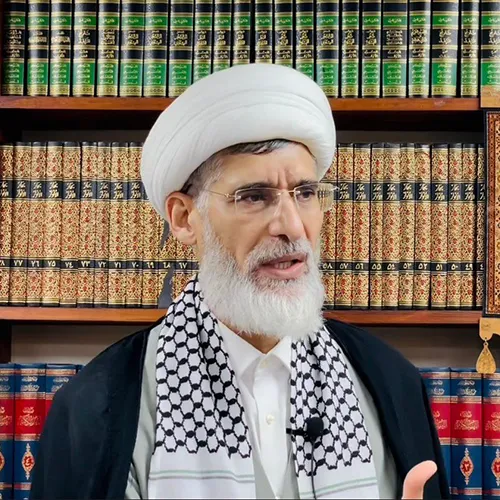Hujjat al-Islam al-Turki
Considering the importance of maintaining the required distance between two Friday prayers in previous weeks, we visited the Abrar Centre in London. There, the Friday prayer leader addresses this issue by delivering two sermons after the noon prayer and then leading the afternoon prayer. This approach could serve as a model for other religious centers facing similar challenges with Friday prayers. Hujjat al-Islam al-Turki, an active figure in the cultural sphere, is the guest of this week’s Friday bulletin.
Question 1: What is the Friday Prayer in terms of quantity and method?
The Friday Prayer is one of the divine obligations prescribed by Allah, set as a gathering for believers to come together once a week. It includes two sermons in which the Imam and preacher address the community’s current issues, the challenges facing the nation, and give reminders of Allah. The sermons often discuss social issues and concerns, providing guidance and solutions to community problems.
To maximize its benefits, Allah has prescribed that Friday Prayer should be held in a main mosque within a specific area, limiting it to one central prayer within a defined legal distance. This arrangement aims to unite the words of the believers, strengthen their ranks, and enhance the religious, spiritual, and social bonds among them.
Question 2: You are in close proximity to another Friday prayer in London; how have you addressed the issue of distance?
Our Friday prayer caters to a completely different community than the nearby Friday prayer. However, we first perform the noon prayer, then deliver two sermons, and finally conduct the afternoon prayer. With this method, we have resolved the issue of the required distance.
Question 3: How can the Friday Prayer be made more engaging? What success have you achieved in this area?
Friday Prayer can be made particularly engaging for youth and children by:
- Enhancing Faith and Understanding
Raising young people’s level of faith and educating them about the importance and virtue of attending Friday Prayer.
- Showing Respect and Interest
Demonstrating respect and attention to youth by the Friday Imams and mosque leaders fosters a welcoming environment that encourages participation.
- Involving Youth in Roles and Responsibilities
Giving young attendees responsibilities in organizing the Friday Prayer, such as reading the Qur’an, making supplications, managing logistics, and publicizing the events, promotes a sense of belonging and active involvement.
- Timing and Conciseness
Ensuring the prayer and sermons are held at a convenient time and are kept concise helps avoid boredom and keeps attendance strong.
- Incorporating Side Activities
Including additional activities tailored for youth and children can make the Friday gathering more appealing and engaging.
- Offering Simple Refreshments
Providing snacks or drinks can be an effective way to encourage young people to attend and engage.
Yes, many of these aspects are implemented in various locations. However, the more these elements are combined in a mosque or religious centre, the more successful, fruitful, and beneficial the Friday Prayer becomes.
Question 4: Explain the Characteristics of Each Friday Prayer Sermon
As previously mentioned, each Friday sermon should include the following elements:
- Admonition and Remembrance of God
Encouraging believers to commit to piety, obey Allah, and follow the example of the Prophet (peace be upon him) and his pure family.
- Reflection on the Prophet’s Life and Morals
Recalling aspects of the life and character of the Prophet (PBUH) and his honorable family, offering them as role models for the believers.
- Addressing Social Issues
Identifying specific social problems or challenges facing the community, particularly those that impact youth or families, and providing appropriate solutions and guidance.
- Discussing Challenges Facing the Islamic Community
Highlighting the challenges facing the Muslim nation and encouraging believers to care for the affairs of Muslims, following the principle: “The example of the believers in their mutual love and compassion is like that of a single body; if one-part aches, the rest of the body reacts with sleeplessness and fever” and “Whoever does not care for the affairs of Muslims is not one of them.”
Question 5: What is Islam’s stance on peacefulness?
The name Islam is derived from the words peace and submission, indicating Islam’s foundational call to peace and submission to God, as emphasized in the verse: “O you who believe, enter into peace entirely” (Quran 2:208). Islam rejects oppression, aggression, tyranny, and coercion in all forms.
Islam’s purpose is to guide people out of the darkness of ignorance, disbelief, and servitude to anyone other than God, leading them into the light of knowledge, faith, and sincere devotion to Allah alone. Through this liberation, Islam promotes complete freedom, dignity, and honor for all.
Question 6: What do you suggest to counter the conspiracy of Islamophobia and anti-Islam sentiment in the West?
Islam faces intense and biased campaigns from adversaries in Western media, with these continuous attacks filled with lies and fabrications about Islam and Muslims. The aim is to distort the image of Islam in the eyes of other societies and to prevent them from learning about Islam directly.
Therefore, all Muslims are called upon to engage in Jihad al-Tabyeen (the effort of clarification) to introduce other societies to the true face of Islam and to effectively respond to these misconceptions, lies, and fabrications.
editor's pick
news via inbox
Subscribe to the newsletter.




